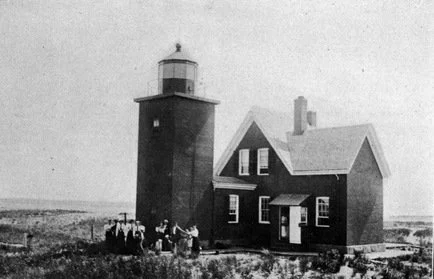Wellfleet’s Atlantis
Billingsgate Island & Lighthouse – Wellfleet’s Lost Outpost
Billingsgate Island once stood about three miles off the Wellfleet shore, a low sandy island fringed with dunes. The Pilgrims recorded it in 1620, and over the next two centuries it became an important landmark for fishing and navigation.
By the 1820s, Wellfleet’s fishing industry was thriving, and a lighthouse was needed to guide vessels through the dangerous shoals around the island. Congress approved funds in 1822, and a stone keeper’s dwelling with an octagonal tower was built that year. William S. Moore became the first keeper.
Erosion was a constant threat. The first lighthouse had to be replaced in 1834 with a brick dwelling and wooden tower. By the 1850s, the sea was once again eating away at the land. In 1858, a third lighthouse—a square brick tower attached to a keeper’s house—was built farther north on higher ground.
The island community flourished for a time. At its peak, Billingsgate had about 30 homes, a school, a whale-oil rendering plant, and seasonal visitors who came for fishing and clambakes. Some houses were later floated to Eastham and Wellfleet as the island shrank.
Isolation was extreme for the keepers, especially in winter. Keeper Herman Dill’s 1875 log described being iced in for over a month with no human contact. That same year, the tower flooded, and in 1876 Dill died in a small boat after a violent storm.
Attempts were made to protect the station—1,000 feet of jetties and bulkheads were built in 1888—but the sea continued to win. By 1915, the lighthouse foundation was undermined, and the tower leaned dangerously. The keeper was removed, the light dismantled, and later that year the lighthouse collapsed in a storm.
For a short time, a skeleton tower and later a buoy marked the location. By the 1940s, the island had largely vanished beneath the waters of Cape Cod Bay. At low tide, remnants of the island’s buildings and foundations can still be seen on Billingsgate Shoal, a haunting reminder of Wellfleet’s “Atlantis.”
1898

